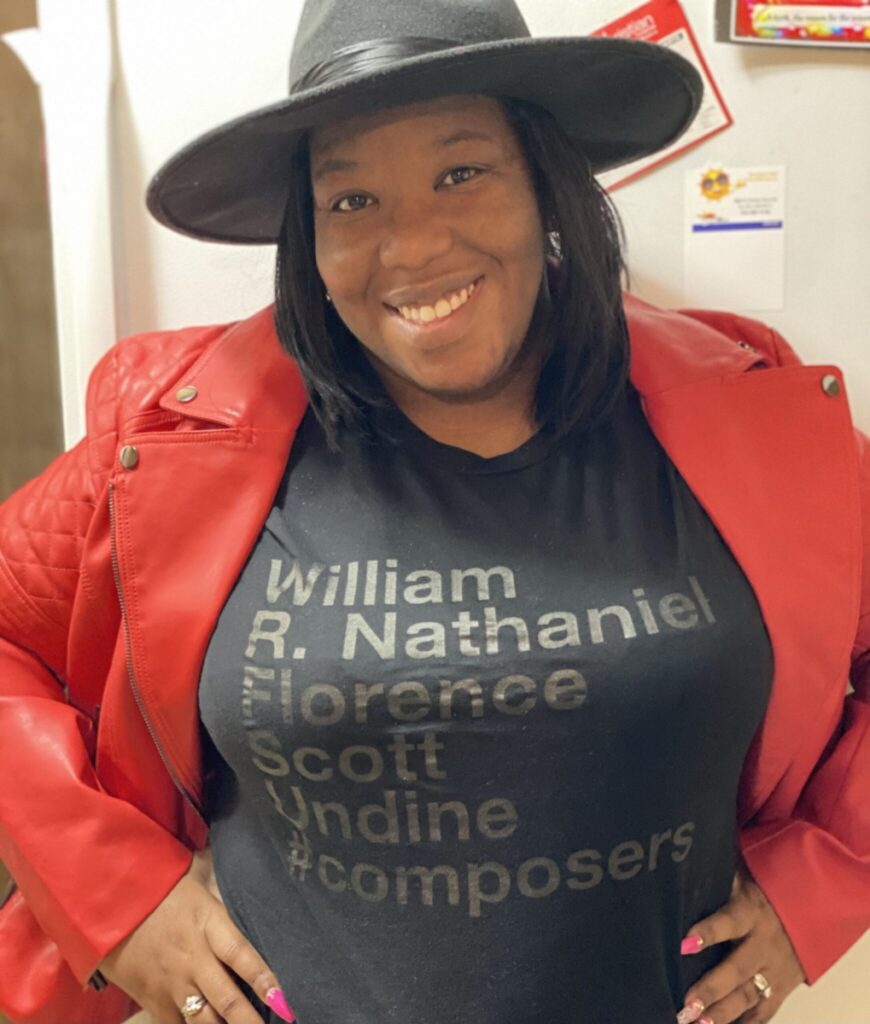(photo credit to my esteemed choral colleague, Maria A. Ellis, who designed and sells this shirt on her website)
After writing my blog post last week which acknowledged my desire to “do better” as an educator, and as a person, I have decided to make permanent strides in my classroom.
This year, I have introduced a new approach which I intend to continue moving forward. From now on, I will make February Black Choral History Month.
As those of you who regularly read my Choral Clarity Blog know, January is solo repertoire month. Traditionally in the month of December, we have our winter concert followed by choir caroling day. After our winter vacation, January is the month where we take a break from choir music to focus mainly on solo repertoire. The goal here is to develop confidence in each individual singer, get all singers to sing throughout their entire range, and inspire them to want to participate in our state’s solo festival.
The transition from January into February can blend so beautifully by introducing gospel music as a bridge. By teaching a gospel piece or warm-up by rote, we can begin the month of February by engaging our students without sheet music; this will allow them to be engaged with full body, mind, and spirit. Check out Maria Ellis’ engaging example of how effectively this can work.
The Future of Black Choral History Month in my Choir
Beginning next year, with the exception of my Valentine’s Day Round, both of my self-selected choirs will spend the entire month of February learning the music of black composers and arrangers. The composers, their backstory and the original backstory of these compositions/arrangements will create a lens for deep discussion and an opportunity for all of us to grow. Some of these pieces will make their way into our spring concert while others will remain in our repertoire for use at other potential choir performances.
The purpose of Choir Black History month, as explained in my previous blog post, is to both expose my students to black composers and help my students to better understand the history of black America through the vehicle of choral music.
Shouldn’t this be an all-year thing? If this is so important, why only focus in February?
I see a number of choir directors on the internet scolding others for “just” recognizing black composers, conductors, etc. during the month of February. I would like to present a different perspective here.
In my opinion, Black History Month is an opportunity to recognize, celebrate, and focus our attention specifically on black history, which doesn’t take away from my ability to focus on black history at other times throughout the year. The bottom line here is that my decision to join in on our country’s recognition of Black History Month is my recognition to do the work: the work to search for black composers, to research the lineage and history of traditional spirituals, and to engage my predominantly non-black students in an uncomfortable, yet meaningful conversation. It will extend beyond February. It will happen with musical choices throughout the year. But it will be prominent, at the forefront, and something that rises above all else in February. It will be something that my students and I will look forward to each and every year.
Uncharted Territory can be scary
As I mentioned in my last blog, this is not easy for me. Being a product of a systemically racist culture has led me to a place where I am nervous about saying the wrong thing and/or doing the wrong thing. This year, just be being open and honest with my students, I’ve already caught myself saying some things that I regret saying. At the end of the day, I have two options: I can ignore Black History Month and be blind to the world that I see or I can be an educator and make a difference in the lives of my students. I must choose to engage in the difficult discussions, choose music that lends itself to discussion, and make the history of black music in America significant, because IT IS.
Last Words
I would like to thank the many black choral directors who have reached out to me, engaged with me, encouraged me, and informed me of ways I could improve. While it is not their job to do this, I am grateful for their willingness to open their hearts to me. I am flawed and am just beginning this journey. I can only hope that as I continue on this path, I can help to inspire my young students to see the world differently than the way I saw it when I was their age.

